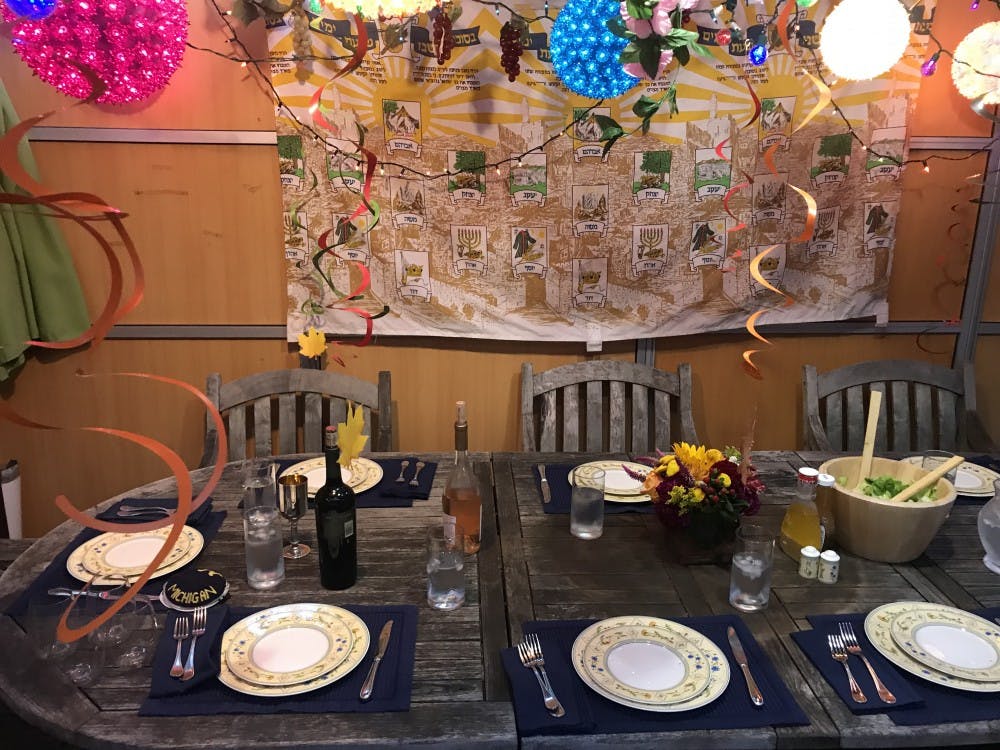The autumn breeze begins to roll over campus. Foliage coats Locust Walk. Excitement about apple–picking trips fill the air. I'm excited for all the typical fall festivities, sure. But this season has always had special meaning to me because of the Jewish holiday of Sukkot.
If you’re not an observant Jew, you’re probably curious about the various hut–like structures that you’ve been seeing around campus, and wondering why people stood outside of them this week asking you to shake some plants around. The name of the holiday refers to the Hebrew word for this temporary dwelling, sukkah, and commemorates the sheltering of the Israelites in the desert. Jews are encouraged to eat, relax, and even sleep in these huts during the holiday. The shaking of plants symbolizes a close relationship with God and a commitment to performing good deeds.
In my Long Island backyard, the sukkah was a staple of fall. Don’t be fooled, though; my family sukkah is certainly no average hut. Ours is decked out with a heating system (only a slight fire hazard), strings of lights meant for Christmas and Cinco de Mayo, drawings from when my brothers and I were young, and of course, good food and friends.
Our sukkah is the ultimate realization of the childhood fort fantasy, the product of a family effort of frustrating attempts to fit together weather warped panels and tangled strings of holiday lights. The Wachsman family makes our hut feel like a home during the holiday, so I sought out the same thing here at Penn. While I did not find a sukkah on campus that was equipped with a heating system, I did find a community, and some pretty good food too (sushi, bagels, BBQ, oh my!).
Before I went to college, Sukkot always represented family, inclusion, and spiritual reflection, so being away for the holiday for the first time is definitely an adjustment. However, Penn’s religious organizations make sure a bunch of programming is in place to give students that warm and fuzzy community we’re used to having at home.
At the “Barbeque in the Sukkah” event on Tuesday, September 25, campus Rabbi Levi Haskelevich spoke to a room of about 50 Jewish students about the holiday, which he described as signifying the unity of the Jewish people and the transition from intensity to joy after the more somber holidays that passed. Penn's Chabad House organized events, including a “Jazz in the Sukkah” mixer for graduate students at Lubavitch House. Students also had the option of going to Hillel’s many planned events, like “Sushi in the Sukkah” on Wednesday, September 26.
Aliza Caplan, the coordinator of Jewish student life at Penn Hillel, says, “when you ask students why they come to Hillel and the students that are really engaged why they value it, it’s really about the community. The Sukkot programming is just an opportunity to gather, to take a moment among the midterms and date parties and pause among people who get it.“
Aliza wants to create an inclusive home–away–from–home, and made sure to extend an invitation to any and all students, “Hillel is a space for everyone on campus” she says. “I want people to know that it should be a home for Jewish students, for non–Jewish students, and for anyone that wants to relax, study, or even enjoy our amazing chicken wraps.”
So what does celebrating look and feel like for students at Penn? Taylor Freeman, (C '20), a member of the Jewish Heritage Project (JHP) says, that being away from family during the Jewish holidays "isn’t exactly ideal." But she appreciates Chabad, saying, "the fact that I have a place…where I can go and celebrate with people I consider my family away from my family is really awesome.”
Sam Strickberger, (C '22), an observant student, attended various Hillel events and services, and describes the programs as “community–builders,” which help ease the transition from celebrating at home for many students. Raquel Levitt, a board member of JHP, says programming is important at Penn during the holidays because “a lot of students who observe holidays at home, especially those that are freshmen, don’t know exactly how they can continue to observe when they get here.”
I have to agree with these students—if you’re seeking community on campus, inclusive programs offered by Penn’s Jewish organizations make memories of a five–star sukkah at home fizzle away. I’ll definitely miss the over–the–top way my family celebrates, but what really matters is enjoying the holiday with good friends, good food, and a supportive community. So I’m doing just fine here at Penn.

